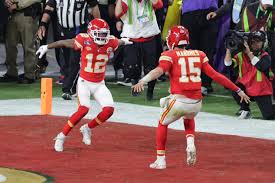
We’ve probably all seen at least a little bit of an NFL game. But rarely, if a game doesn’t have a winner after all four quarters are over, then the game goes into overtime, a sudden-death period of fifteen minutes where next score wins. At least, that’s how it was until recently, when the NFL decided to change the overtime rules in 2023 following a playoff game that caused a lot of backlash: Bills vs. Chiefs, Divisional Round, 2022.
The game was one of the most entertaining playoff games to date. There were multiple scores within the last two minutes of the fourth quarter. With a few seconds left, Chiefs kicker Harrison Butker kicked a 49-yard field goal to send the game into overtime. The overtime rules in 2022 were different: it was first score wins, unless the first drive ends in a field goal. A touchdown or a defensive safety would win the game. Overtime starts with a coin toss that decides who gets the ball first. The Chiefs won the toss and elected to receive, meaning they would get the ball. Bills quarterback Josh Allen could only watch from the sidelines as the Chiefs stormed down the field and scored a touchdown to Travis Kelce. The touchdown won the game for the Chiefs, but the NFL realized that games like these needed better overtime rules that would give both teams a chance.
Over that same offseason, Roger Goodell, the league’s commissioner, decided that playoff overtime would be different from regular season overtime. First, he lowered the overtime clock from fifteen minutes to ten minutes during regular season games. Then, he changed the playoff rules to give both teams a possession. He made it so a touchdown would not end the game, but instead give the ball to the other team and give them a chance at a possession. If the first drive ends in a safety, it will still end the game, because a safety gives the team who got it two points and the ball, so the game would end right after the punt.
We were able to see these new rules in action in Super Bowl 58, where the Chiefs and 49ers could not settle the Super Bowl winner after four quarters. The game was tied 19-19 on the back of another last-second Harrison Butker field goal. The 49ers were the visitors, so they called the coin toss. Team captain Fred Warner called tails and they won the toss, electing to receive the kickoff. On that drive, San Francisco drove down to the ten-yard line, but the drive stalled out and they were forced to kick a field goal. The Chiefs got a chance to possess the ball, and they drove down to the 3. With 3 seconds left in the first overtime period, and Taylor Swift in attendance, Patrick Mahomes threw a touchdown to Mecole Hardman to win the game, 22-25.

With the new overtime rules for the playoffs, we are sure to see many exciting games that aren’t just decided by one overtime drive. Playoff games will now be more entertaining for viewers, as well as fairer for the players.
Related Stories:
https://www.espn.com/nfl/game/_/gameId/401326633
https://www.sbnation.com/nfl/24063669/nfl-super-bowl-overtime-rules-explained
Take Action:





